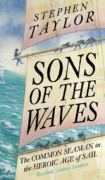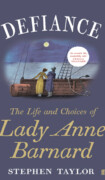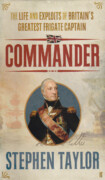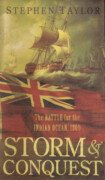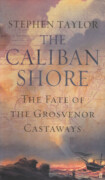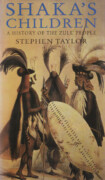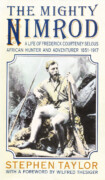
THE CALIBAN SHORE:
The Fate of the Grosvenor Castaways
Faber and Faber, London, and W.W. Norton, New York, 2004.
BBC Radio 4, Book of the Week, February, 2004.
The enthralling story of an 18th century shipwreck and what befell the ship’s castaways on the Wild Coast of Southern Africa covered some familiar ground while also opening me to a new world, of seafaring in the great age of sail.
When the Grosvenor ran ashore on a treacherous coastline in 1782 an astonishing number of her crew and passengers – who included women and children – reached the shore safely. But the castaways were hundreds of miles from the nearest European outpost – and utterly ignorant of their surroundings and the people among whom they found themselves.
“In the gathering gloom of that first evening in Africa, among the fires burning at the edge of the Indian Ocean, they found themselves in the midst of the dark figures who had gathered on the rock shelf. The two groups surveyed one another with mutual incomprehension: on the one hand the dishevelled castaways; on the other, black warriors with high conical hairstyles and daubed with red mud.”
From the cover: Stephen Taylor pieces together this extraordinary saga with tremendous narrative flair. Drawing upon much new research, he sifts the myths that became attached to the Grosvenor from a reality no less gripping. Taking the reader to the heart of what is now the Wild Coast of Pondoland, The Caliban Shore reveals the misunderstandings that led to tragedy, tells the story of those who escaped and unravels the mystery of those who stayed.
REVIEWS
“Masterly. Taylor goes about his task in a painterly way, with sweeping brushstrokes and passages of thrilling chiaroscuro .. A great adventure story.”
– Jan Morris, The Observer
“A wonderful book, hugely satisfying on many levels – as a survival-and-ordeal chronicle, as social history, as anthropology, and as an early foray into the exotic, but most of all as an adventure.”
– Paul Theroux
“Taylor strips away the barnacles of legend, melodrama and racism that encrusted the initial tragedy and gives us a story that is complex, moving and immaculately paced.”
– Nicholas Shakespeare, The Daily Telegraph
“A deftly reconstructed slice of high seas drama … Taylor has travelled in the castaways’ footsteps and result is a superbly researched hybrid of history and detection … A marvellous account of Europeans adrift in 1780s Africa, as well as a dark parable of the rat-like behaviour of marooned human beings.”
– Ian Thomson, Independent on Sunday
“A painstakingly researched and superbly written telling of an enthralling story.”
– William Palmer, Literary Review
“Taylor takes us into entirely unexpected places, into stories that can only be half-told but which have extraordinary resonance. He does so by respecting his sources, not exaggerating them … It’s curious but true: sometimes you write the best and most absorbing stories when you trust a very old-fashioned notion of fact.”
– Michael Pye, The Scotsman
“Compelling reading … For years rumours of whites living among the native people persisted. Taylor concludes his dramatic and moving book with a subtle assessment of the possible truth behind these stories.”
– Sunday Times
“The narrative’s beautifully observed descriptions of one of the remotest regions on earth render the survivors’ ordeal more than poignant.”
– Times Literary Supplement
“Taylor has immersed himself in his subject, and as a result the book manages to satisfy the specialist demands of the maritime historian while at the same time offering a great deal of action, drama and intrigue to the reader of historical adventure stories.”
– Huw Bowen, International Journal of Maritime History
“It is a yarn replete with disaster, yet it captures too the thrilling days of sail – the whiff of the goats in the hold, the slosh of the gundeck being washed with vinegar, the flamingo pink flush of the Indian Ocean at dawn … Like all good histories, it opens a window onto the past.”
– Sarah Wheeler, The New York Times
“Taylor’s key achievement is in writing an adventure-survival story that keeps you turning the pages, even as, more subtly, he examines how survivors’ attitudes towards their alien surroundings helped shape their fate … Taylor confirms himself to be a frank and gifted analyst of white-black relationships and encounters in Africa.”
– Michael Upchurch, Seattle Times
“A cracking yarn … The epilogue, which compiles the scandals and trickery which followed the fate of the castaways, from phoney and real treasure hunts to the wreck’s discovery by divers, is a beautifully weighted conclusion to so tragic a story.”
– Lloyd’s List
“A mesmerising nautical tale … Accounts of disaster at sea have felled many a tree. What sets this superb history apart comes from Taylor’s extensive knowledge of Africa.”
– USA Today
“A dark, haunting narrative worthy of a novel by Joseph Conrad … A brilliantly researched, impressively illustrated and beautifully written book.”
– The Age, Melbourne
“Skilfully switching among his picaresque cast, Taylor traces a fascinating saga of cowardice, heroism, stupidity, betrayal, endurance, horror and redemption.”
– The Australian
“His narrative sweeps one away like a riptide.”
– Mail and Guardian, Johannesburg
“Lucid and entertaining. Taylor has made of the uncertainties and areas of silence – and the careful research and reconstruction they have put him to – an absorbing study.”
– Natal Witness
“His is a valuable contribution to a story that has lived on in South African culture for both the best and worst reasons … Taylor breathes life into these stumbling and dishevelled remnants of English privilege.”
– This Day

